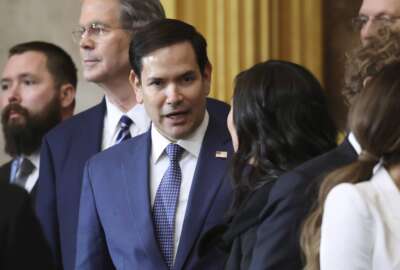Senate OKs postal amendments to limit conference spending, stave off closures
In a marathon series of votes Tuesday, the Senate considered more than a dozen amendments to a postal reform bill, approving a provision to limit all federal...
In a marathon series of votes Tuesday, the Senate considered more than a dozen amendments to a postal reform bill, approving a provision to limit all federal agencies’ spending on conferences, but voting down an amendment expanding the federal workers’ compensation program. Lawmakers also rejected an amendment that would have required retirement-eligible USPS employees to retire without a buyout payment.
The votes Tuesday represent just a fraction of the 39 amendments offered to the 21st Century Postal Service Act, many of them only tangentially related to the Postal Service’s financial woes.
The Senate will resume voting on amendments Wednesday at 2 p.m. before voting on a final version of the bill.
The postal reform bill, sponsored by a bipartisan group of senators, including Joseph Lieberman (I-Conn.) and Susan Collins (R-Maine), is designed to put the Postal Service on firmer financial ground. Last year, alone, USPS posted losses of $5.5 billion and expects to lose $17 billion by 2015, barring congressional action.
The bipartisan bill, which is also sponsored by Sens. Tom Carper (D-Del.) and Scott Brown (R-Mass.), would refund to USPS overpayments it made to the federal retirement system. That will allow the agency to pay for buyouts for some 100,000 retirement-eligible employees. The bill also opens the door to a separate health-insurance plan for USPS employees, giving agency officials and the postal unions until September 2012 to negotiate a plan for breaking out its own health program.
The bill would allow USPS to move toward ending Saturday mail delivery, but only after two years and after exhausting other cost-saving measures. Before closing postal facilities, USPS would be required to gather “rigorous public comment” and to conduct a study examining whether it would be more cost-effective to downsize the facility rather than close it.
Amendment targets conference spending
In a unanimous voice vote, the Senate approved an amendment introduced by Sen. Tom Coburn (R-Okla.) setting limits on agency conference spending.
“Congress has finally said ‘the party’s over’ when it comes to conference spending,” Coburn said, referencing the recent General Services Administration scandal, which cast a harsh light on wasteful event spending.
Coburn’s amendment limits agencies’ conference spending to 80 percent of the amount spent on conferences in 2010 and caps the cost of a single conference to $500,000. In addition, agencies would be required to post quarterly reports on their websites detailing conference costs, how the conference advanced their mission and a list of conference attendees, including non-federal employees.
Workforce issues a sticking point
Federal workforce issues — not necessarily specific to USPS — drew some of the most divided votes.
Coburn also introduced an amendment that would have required the Postal Service to dismiss retirement-eligible without an accompanying buyout incentive payment, creating a mandatory retirement system. The Senate rejected that amendment in an up-or-down vote.
Similarly, lawmakers rejected an amendment, introduced by Sen. Daniel Akaka (D-Hawaii), that would have strengthened the Federal Employees’ Compensation Act (FECA) program. As it stands, the larger postal reform bill would convert employees from FECA into the federal retirement system once they reach Social Security age, which critics of the proposal see as akin to cutting benefits.
Akaka’s bill would have struck those provisions in favor of an update to FECA already passed by the House, which among other things allows nurse practitioners to certify disabilities.
“It is disappointing to see the Senate bill include language that is harmful to injured federal workers, while more commonsense improvements to FECA are left on the table,” said Colleen Kelley, the president of the National Treasury Employees Union, in a statement.
Postal closures made more difficult
Many of the amendments approved by the Senate would impose even stricter rules on the Postal Service before it could close or consolidate facilities, including rural post offices and mail-processing facilities.
Sens. Claire McCaskill (D-Mo.) and Jeff Merkley (D-Ore.) won passage of their amendment, which would bar USPS from closing rural post offices if the next closest office is 10 miles or more more away, among a number of other requirements.
The Senate also approved an amendment sponsored by Sens. Ron Wyden (D-Ore.) and Dianne Feinstein (D-Calif.), which would bar the Postal Service from closing facilities before the 2012 election in states that offer voting by mail.
Five-day delivery debated
The greater postal bill largely leaves it up to the Postal Service to determine whether it will end Saturday mail delivery. The bill only directs USPS to consider other cost-cutting measures first.
Competing amendments to either block a five-day delivery week or allow USPS to move immediately to one were both voted down.
RELATED STORIES:
USPS plans for workforce cuts as Senate expected to take up reform bill
Postal bill amendment seeks to cut backlog ahead of USPS retirement ‘deluge’
Senators’ USPS plan cuts staff, refunds FERS overpayments
Copyright © 2025 Federal News Network. All rights reserved. This website is not intended for users located within the European Economic Area.





